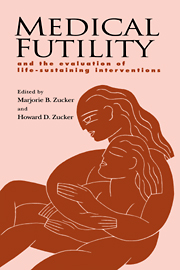Book contents
- Frontmatter
- Contents
- Preface
- Foreword
- Contributors
- 1 Medical futility: a useful concept?
- 2 Death with dignity?
- 3 Physicians and medical futility: experience in the critical care setting
- 4 Physicians and medical futility: experience in the setting of general medical care
- 5 Futility issues in pediatrics
- 6 Medical futility: a nursing home perspective
- 7 Alternative medicine and medical futility
- 8 How culture and religion affect attitudes toward medical futility
- 9 When religious beliefs and medical judgments conflict: civic polity and the social good
- 10 Conflict resolution: experience of consultation-liaison psychiatrists
- 11 Ethics committees and end-of-life decision making
- 12 The economics of futile interventions
- 13 Medical futility: a legal perspective
- 14 Professional and public community projects for developing medical futility guidelines
- 15 Community futility policies: the illusion of consensus?
- 16 Not quite the last word: scenarios and solutions
- Index of cited authors, cases, and statutes
- Subject index
Foreword
Published online by Cambridge University Press: 11 September 2009
- Frontmatter
- Contents
- Preface
- Foreword
- Contributors
- 1 Medical futility: a useful concept?
- 2 Death with dignity?
- 3 Physicians and medical futility: experience in the critical care setting
- 4 Physicians and medical futility: experience in the setting of general medical care
- 5 Futility issues in pediatrics
- 6 Medical futility: a nursing home perspective
- 7 Alternative medicine and medical futility
- 8 How culture and religion affect attitudes toward medical futility
- 9 When religious beliefs and medical judgments conflict: civic polity and the social good
- 10 Conflict resolution: experience of consultation-liaison psychiatrists
- 11 Ethics committees and end-of-life decision making
- 12 The economics of futile interventions
- 13 Medical futility: a legal perspective
- 14 Professional and public community projects for developing medical futility guidelines
- 15 Community futility policies: the illusion of consensus?
- 16 Not quite the last word: scenarios and solutions
- Index of cited authors, cases, and statutes
- Subject index
Summary
Many aspects of modern medicine provoke spirited ethical argument, but few engender as much disagreement about what exactly is at issue as does the futility debate. The relationships of physicians and nurses, on the one side, and patients (especially dying patients dependent on extensive medical support) and their families, on the other, are viewed very differently by various commentators. As characterized by some, physicians have become pathetic characters in a modern day Molière play, technically sophisticated servants doing the bidding of their patients. Professionals with this perception feel misused and justify their rebelliousness by invoking medical futility. The simple recognition of the limits of medicine's power to cure and to extend life denotes that health care professionals should not be obliged to provide further treatment or, more powerfully, that they would exceed their role-based authority as healers to continue to do so. Yet other commentators claim that medical futility is an empty concept that does not provide any ground for decision that would not be present had the concept never been coined. They characterize medical futility as nothing more than a cover for physician's rearguard action to regain the dominance in decision making that they possessed before autonomy and informed consent shifted authority to patients and their families beginning in the 1960s.
- Type
- Chapter
- Information
- Medical FutilityAnd the Evaluation of Life-Sustaining Interventions, pp. xi - xvPublisher: Cambridge University PressPrint publication year: 1997

